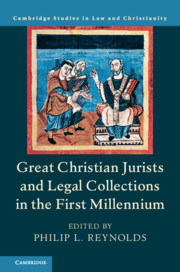Book contents
- Great Christian Jurists and Legal Collections in the First Millennium
- Law and Christianity
- Great Christian Jurists and Legal Collections in the First Millennium
- Copyright page
- Contents
- Contributors
- Preface and Acknowledgments
- Abbreviations
- Part I
- 1 Normative Texts and Practices of the First Millennium
- 2 The Many Voices of Roman Law
- 3 The Law of the Post-Roman Kingdoms
- 4 Ecclesiastical Councils
- 5 The Papacy
- 6 The Sacred Palace, Public Penance, and the Carolingian Polity1
- 7 Canonical Collections
- 8 The Practice and Literature of Penance
- 9 Monastic Rules
- Part II
- Index
- References
5 - The Papacy
from Part I
Published online by Cambridge University Press: 21 June 2019
- Great Christian Jurists and Legal Collections in the First Millennium
- Law and Christianity
- Great Christian Jurists and Legal Collections in the First Millennium
- Copyright page
- Contents
- Contributors
- Preface and Acknowledgments
- Abbreviations
- Part I
- 1 Normative Texts and Practices of the First Millennium
- 2 The Many Voices of Roman Law
- 3 The Law of the Post-Roman Kingdoms
- 4 Ecclesiastical Councils
- 5 The Papacy
- 6 The Sacred Palace, Public Penance, and the Carolingian Polity1
- 7 Canonical Collections
- 8 The Practice and Literature of Penance
- 9 Monastic Rules
- Part II
- Index
- References
Summary
This chapter describes the institutional, political, and legal changes that the Roman episcopacy underwent during the first millennium. It sketches the historical developments that led to the emergence of the papacy as an institution, and it describes the first official papal decretals and the early collections of papal decisions. The chapter also examines the evolving ideas of Petrine and Pauline succession and of papal supremacy. Inseparably linked to those ideas was the relationship between the bishops of Rome and the ever-changing but enduring Byzantine Roman Empire. In the period under study, the papacy had to deal with many external and internal challenges, which shaped the Roman episcopacy during the first millennium and thereafter. The chapter should be read in connection with the chapters on two popes: Leo the Great (440–461) and Gregory the Great (590–604).
- Type
- Chapter
- Information
- Publisher: Cambridge University PressPrint publication year: 2019

